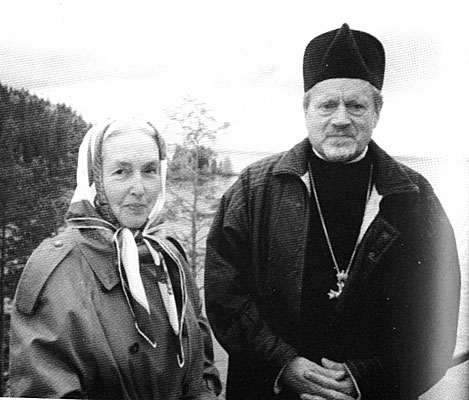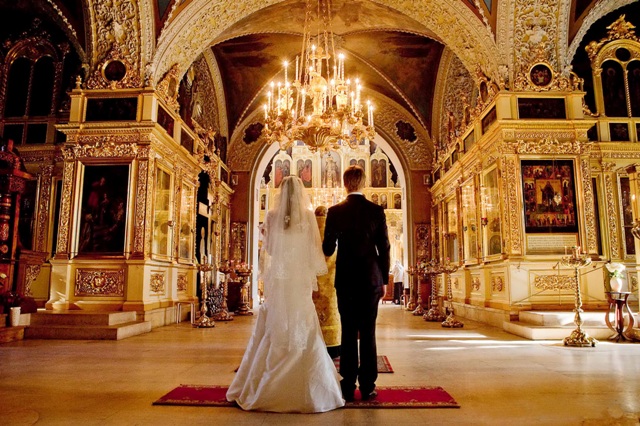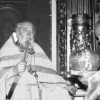They Became One Flesh
 Then the Lord God said, “It is not good that the man should be alone; I will make him a helper fit for him”… and the rib which the Lord God had taken from the man He made into a woman and brought her to the man… Therefore a man leaves his father and his mother and cleaves to his wife, and they become one flesh (Genesis 2:18-24).
Then the Lord God said, “It is not good that the man should be alone; I will make him a helper fit for him”… and the rib which the Lord God had taken from the man He made into a woman and brought her to the man… Therefore a man leaves his father and his mother and cleaves to his wife, and they become one flesh (Genesis 2:18-24).
In the very beginning of human existence, God established one of the essential laws of human nature: It is not good that the man should be alone. Even modern philosophy – that of Freud, for example – finds in this law an explanation of the most intimate psychological and physiological impulses of man, although philosophical systems in the Freudian tradition usually loose all sense of balance and measure, and cannot be accepted as such. Even so, it is impossible to deny a fundamental truth to God’s words, for a person in isolation often tends to live for himself, developing a spirit of self-sufficiency, while loosing the sense of responsibility for others and his freedom to love, thereby further isolating himself from true human happiness. So quite naturally, a man leaves his father and his mother and cleaves to his wife, and they become one flesh.
But it must be remembered that this law of human love has been given to man still in paradise, to a man who lived in conformity with his Creator’s will and in accordance with the purpose for which he was created, to an ideal man. Neither the story of Adam and Eve’s fall, as described in the Book of Genesis immediately after the account of their creation, nor any historical or scientific research, can tell whether such an ideal humanity existed on earth for any substantial length of time. For through man’s unwillingness to obey God and to enjoy the happiness granted to him, evil and death entered into the world and all aspects of human life went astray from their original form and purpose. All natural instincts acquired an ability to be misused: man’s position of dominion over the earth (Genesis 1:28-29) became his instinct of egoistic domination and the natural use of the earth’s fruits became gluttony. Of course, none of these abused instincts can be fully satisfied, as they point to a goal which is beyond human reach: man can still be happy with God, but he cannot be fully happy while lie remains alone.
According to Christian revelation, the abuse of human instincts were not in the original plan of God; they came with man refusing God’s company and fellowship, wishing to be by himself. And since he had no true life in himself, he became mortal, and thus utterly unsatisfied, and finally, sinful.
The original affinity of man and woman was also touched by this universal corruption: the instinct of bringing together two human beings acquired an element of self-satisfaction: the “other” ceased to be a friend and became a “thing” determined for a certain usage. All sexual depravations come from this fundamental transformation of the original meaning of sexual relations. And since, in this dimmed form, the sexual instinct cannot bring full satisfaction, it produces not only suffering, but also instability and constant search for “something better.” The physical strength of the man permitted him to establish regimes of polygamy, and marriage was considered as a temporal contract, which could be dissolved at any time by not only a bilateral, but often also a unilateral, agreement. God’s command of being fruitful, of multiplying and replenishing the earth (Genesis 1:28) while remaining a valid part of marriage, involved not only the physical suffering of the woman, but also material and moral responsibility, and finally the sad realization that children will share in the same mortal and limited life as their parents.
However, in spite of all this, man continues to follow the laws of his nature, to look for a companion, and to expect fulfillment in marriage of his personal destiny and happiness. And his expectations are often being fulfilled, because the present human condition, in spite of all its corruption, has retained elements of its original purpose. God blesses human happiness and rejoices in it. He also condescends to human weaknesses. In the Old Testament, He even has admitted such institutions as polygamy and divorce because He knew that man was still unable to understand his own original destiny and to live in accordance with it. However, a new and perfect life was revealed by the restoration of human nature in Christ, and the original plan of God was reenacted in an even more perfect way.
A Great Mystery
 The Apostle Paul, in his Epistle to the Ephesians (5:25-32), in the passage which is read at the ceremony of the marriage crowning, gives the new Christian meaning of the union between man and woman. He refers to the text of Genesis, but adds to its significance an entirely new dimension:
The Apostle Paul, in his Epistle to the Ephesians (5:25-32), in the passage which is read at the ceremony of the marriage crowning, gives the new Christian meaning of the union between man and woman. He refers to the text of Genesis, but adds to its significance an entirely new dimension:
Husbands, love your wives, as Christ loved the church and gave Himself up for her . . . because we are members of His body . . . This is a great mystery, and I take it to mean Christ and the Church.
Man was created in order to share in God’s communion, and God, through the coming of Christ, by becoming man Himself, did not only restore what human sin has corrupted, but also gave man the possibility to partake of divine life. When a man is baptized, he accepts into his own flesh the power of Christ’s death and resurrection, and should therefore walk in newness of life (Romans 6:4). When he participates in the communion to the Body and Blood of Christ, he becomes a member of Christ.
Marriage then ceases to be simply the satisfaction of a natural human instinct, or the fulfillment of man’s search for earthly happiness. It is an event that concerns not only the newly married couple, but also Christ Himself, for two of His members are being joined in one within the whole Church, which is the Body of Christ. The crowns that are placed on the heads of the couple are martyrs’ crowns, as indicated by the hymn “O Holy Martyrs” that is sung during the circular procession around the Table during the Crowning service. “Martyr” means “witness” in Greek. The new husband and the new wife are thus called by the Church to be eternally – the circle is always a symbol of eternity – witnesses of the union of Christ with the Church. Marriage, then, ceases to be a “private affair.” The meaning of Christian life is precisely to go beyond the simple egotistic interests of man. This new dimension is what constitutes the whole difference between a Christian marriage and the one that is concluded outside of the Church.
In the early days of the Church, marriage was not celebrated, as today, during a special ceremony or rite that one attends by special invitation. It took place, after the bishop had given his permission for the union, at the solemn Sunday Eucharistic Liturgy. The whole community was gathered together as Body of Christ and the couple solemnly took Communion together, with the whole Church witnessing their pledge to be together and their desire to build a new Christian family. In our present rite, several elements recall that early stage of the celebration of marriage: the ceremony of the “Crowning” starts, as does the Liturgy, with the exclamation “Blessed is the Kingdom,” and the rite itself includes such elements as the singing of the “Our Father” followed by the couple’s participation in a common cup of wine. It is not the place here to discuss the reason why this cup ceased to be the Cup of Communion to the Body and Blood of Christ, but it is important to understand that the Holy Orthodox Church has always considered marriage in its relation to our common life in the Body of Christ. When two souls and two bodies are accepting to be united in marriage, it is “a great Mystery” and it concerns “Christ and the Church.”
Christian marriage is, therefore, not simply the fulfillment of a set of rules that do exist even outside of the Church, such as mutual faithfulness, social honorability and responsible education of children. It is much more than that. It is:
Mutual faithfulness, not for the sake of human, social, or psychological reasons only, but because Christ abides in both our souls and bodies, and that He is concerned with what we do with them; when St. Paul was confronted with questions of fleshly sin, he wrote: Do you not know that your body is a temple of the Holy Spirit within you, which you have from God? You are not your own; . . . Shall I therefore take the members of Christ and make them members of a prostitute? (1 Corinthians 6:19, 15).
- A constant effort to live not for one’s own self, but for the other’s because “Christ loved the Church and gave Himself up for her” (Ephesians 5:25); mutual dedication is the main psychological and moral content of marriage, for both the man and the woman. The role of direction and initiative, which belongs to the man, is primarily a function and a responsibility. It does not indicate any moral superiority of the man over the woman.
- Childbirth, which is to be understood in the context of what the Church expects from it: the birth of new members of Christ. The parents, whose union must naturally result in the appearance of new human life, are also responsible for their children’s spiritual birth, their participation in the sacraments, and their religious education; a couple that avoids any of these responsibilities – actual childbirth, followed by spiritual and material care for the children – betrays not only the grace of the Sacrament of Marriage, but their very status as Orthodox Christians, members of the Body of Christ.
All these elements are, of course, incomprehensible if one does not understand that the Kingdom of God calls for the Transfiguration and renewal of our whole self, body and soul, and that every step of our existence – our birth, our marriage, our death – become really different when they are accomplished in Christ. Why care about the sacraments, if anyhow all this remains the same? This difference has been marked by the Lord Himself, when, after having given His teaching on marriage as an inseparable union of two beings, He was told by His disciples:
If such is the case of a man with his wife, it is not expedient to marry. But He said to them, ‘Not all men can receive this precept, but only those to whom it is given.’ (Matthew 19:10-11).
We Orthodox Christians have been given everything: the whole Truth, the grace of the Holy Spirit, and the new eternal life. Let us not forget it.
Practical Questions and Answers
1. If “it is not good that the man should be alone,” why does the Church encourage and bless monasticism?
The Lord said: in the resurrection they neither marry nor are given in marriage, but are like angels in heaven (Matthew 22:30); and St. Paul, thinking primarily of the constant expectation by Christians of the glorious day of universal resurrection, wrote: To the unmarried and widows I say that it is well for them to remain single as I do (1 Corinthians 7:8). Such is also the meaning of the eunuchs for the sake of the kingdom, mentioned by the Lord (Matthew 19:12). By remaining celibate, monks or nuns want to manifest the real presence, in the Church and in themselves, of the Kingdom of God and to try to express this presence through their own lives.
But we have seen that true Christian marriage is also an image of the union between Christ and the Church. Both monasticism and marriage are, therefore, two different ways to manifest the great Mystery of our communion with Christ, but neither of these states of life can be justified by any egoistic or individualistic motivation.
2. What is the teaching of the Orthodox Church on “mixed marriages”?
Orthodox canon law strictly forbids marriages of Orthodox Christians with the non-Orthodox (Sixth Ecumenical Council, canon LXXII). What has been said earlier shows clearly that the whole teaching of the Church implies that a Christian marriage is a marriage between two members of the Body of Christ, which is expressed by the common participation of the couple in the Eucharist, their taking Holy Communion together. Originally the marriage service itself took place as part of the Sunday Liturgy. “Mixed marriage” became possible only when the marriage ceremony was separated from the Liturgy.
“Mixed” marriages are being permitted today only according to the principle of “economy,” which permits the Church to abstain from applying canon law strictly, hoping that such a condescension would bring forth better practical results than strictness. Thus, the Church always hopes that the Orthodox party will finally bring the whole family into the Orthodox Church. However, in cases when the ceremony of marriage is performed outside the Orthodox Church, and when children are not educated in the Orthodox faith, there is an obvious betrayal of Orthodoxy and any condescension can rarely be justified.
3. Does the Orthodox Church admit divorce?
When asked quite specifically about divorce, which was admitted by the Old Testament Law, the Lord answered: I say to you: whoever divorces his wife, except for unchastity, and marries another, commits adultery, and he who marries a divorced woman commits adultery (Matthew 19:9). The Church cannot teach any other doctrine than that of Christ, our Lord.
However, as in the case of mixed marriages, the principle of “economy” is applied, but only by condescension for human weakness. When a marriage is already destroyed – as in the case of unchastity, mentioned by the Lord – the Church considers it possible to bless her sinful member for a new marriage union. But such condescension always implies sincere repentance and therefore, the rite of the second marriage possesses a marked penitential character.
True Christian marriage is unique. Such a marriage is therefore required of all members of the clergy. A priest cannot be married with a widow or a divorcee; furthermore, a priest may be married only once.
4. What is the attitude of the Orthodox Church towards birth control?
No universal disciplinary decision on this question has ever been taken by the Orthodox Church, as the Church has never possessed the tendency to regulate all areas of human life according to one single pattern. The practical attitude of Orthodox Christians must, therefore, be determined by the general doctrine of the Church concerning marriage.
It should be noted that the Church definitely teaches that marriage implies childbirth. The woman, says St. Paul, will be saved through bearing children, if she continues in faith and love and holiness, with modesty (1 Timothy 2:15). However, nowhere in Scripture is it said that childbirth is the only aim of marriage. Marriage is essentially an inseparable union, both spiritual and carnal, of two beings. St. Paul teaches: For the wife does not rule over her own body, but the husband does; likewise the husband does not rule over his own body, but the wife does. Do not refuse one another except perhaps by agreement for a season, that you may devote yourselves to prayer; but then come together again” (1 Corinthians 7:4-5).
It is clear, therefore, that such a union – an image of the union between Christ and the Church – should not be broken when reasons of medical or moral nature prevent repeated childbirth. Such reasons do often arise, since human nature, in its present state of corruption due to original sin, does not always follow the law of God. Promotion of unlimited childbearing cannot, therefore, be based upon the idea that “we should follow nature.” Fallen nature can and must be corrected, not only by prayer and abstention, but also by human means.
Orthodox Christian couples should, therefore, consult their own conscience – and, even better, their Father Confessor – at those times when they are considering measures of birth control. Then they may decide whether these measures are justified, or whether they would not simply indicate a lack of confidence in God and faith in His help. In the latter case, such measures would be sinful.

















